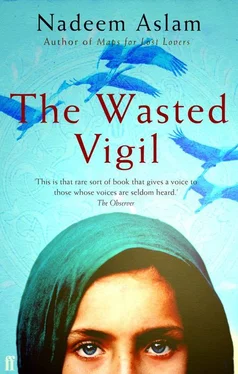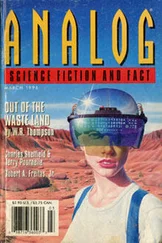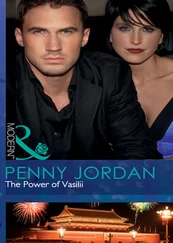Nadeem Aslam - The Wasted Vigil
Здесь есть возможность читать онлайн «Nadeem Aslam - The Wasted Vigil» весь текст электронной книги совершенно бесплатно (целиком полную версию без сокращений). В некоторых случаях можно слушать аудио, скачать через торрент в формате fb2 и присутствует краткое содержание. Год выпуска: 2009, Издательство: Faber and Faber, Жанр: Современная проза, на английском языке. Описание произведения, (предисловие) а так же отзывы посетителей доступны на портале библиотеки ЛибКат.
- Название:The Wasted Vigil
- Автор:
- Издательство:Faber and Faber
- Жанр:
- Год:2009
- ISBN:нет данных
- Рейтинг книги:4 / 5. Голосов: 1
-
Избранное:Добавить в избранное
- Отзывы:
-
Ваша оценка:
- 80
- 1
- 2
- 3
- 4
- 5
The Wasted Vigil: краткое содержание, описание и аннотация
Предлагаем к чтению аннотацию, описание, краткое содержание или предисловие (зависит от того, что написал сам автор книги «The Wasted Vigil»). Если вы не нашли необходимую информацию о книге — напишите в комментариях, мы постараемся отыскать её.
The Wasted Vigil — читать онлайн бесплатно полную книгу (весь текст) целиком
Ниже представлен текст книги, разбитый по страницам. Система сохранения места последней прочитанной страницы, позволяет с удобством читать онлайн бесплатно книгу «The Wasted Vigil», без необходимости каждый раз заново искать на чём Вы остановились. Поставьте закладку, и сможете в любой момент перейти на страницу, на которой закончили чтение.
Интервал:
Закладка:
Returning from a week-long stay at the hospital in Kabul, Marcus found all the books in the house nailed to the ceilings.
THE HIGH GRASS REACHES UP to his pelvis as Casa makes his way towards the lake, the seed heads brushing his hands. Two o’clock in the afternoon.
A roof of sparrows goes by overhead. To save ammunition he would always shoot only when there was a chance of taking two birds at once — aiming at the point where the flight paths were to cross.
He cannot be sure if he took this route to the factory that night. If he dropped the Kalashnikov in a damp or wet place he’ll have to wipe off the water from inside it and reoil the entire mechanism, a task that will take several hours, if he is lucky enough to locate some oil, that is. Walking around, trying to remember, he is put in mind of the time he had practised laying minefields at the al-Qaeda training camp. As the procedure allowed no carelessness, everything was mapped out beforehand with precise co-ordinates: a few days later he would have to come back and find the mines as part of the training. An inattentive holy warrior could be killed by a mine he had laid himself.
He changes direction on seeing the small flock of demoiselle cranes on the lake’s edge. Grey and black, with white ear-tufts and crimson eyes. One of them raises its wings a little in order to close them more comfortably. Several were kept at one of the madrassas in Pakistan as they are better than watchdogs in warning of intruders. The ground delves under his feet and the cranes are obscured from view behind the wall of grass as he walks towards them.
He stops on seeing them. They are perfectly still, looking at him. Three white men, young like him but bigger, one of them without a shirt so that slabs of muscle stand exposed. A couple are armed with third-generation Glock 22s. Then an Afghan man appears and joins them.
‘Who are you?’ the Afghan asks. He is holding Casa’s rifle.
Casa points towards Marcus’s house back there, not taking his eyes off the whites, one of whom has his finger on the trigger though the weapon hangs down beside his leg.
‘The old doctor’s house?’
He gives a nod, trying not to look at the Kalashnikov, betraying recognition.
The questioner turns to the other three and, huddling, says something in English to them. A tense glance directed towards him from time to time.
Casa asks the Afghan — the West’s running dog — who his companions are but gets no answer. He repeats the question but it is as though they are incapable of hearing him. They now motion for him to follow as they begin to walk out of the river of grass, and in turning away the half-naked man reveals that he has a life-size tattoo of a Glock handgun at the small of his back, just to the left of his spine’s base. Only the tilting grip and part of the trigger are showing, the muzzle hidden beyond the waistband of his trousers — as it would be if a weapon were kept there.
One of the whites hangs back so that he is behind Casa as they emerge onto the path.
With the Afghan translating, the white men want to know how he got his injury.
‘A bandit. Are they American?’
A tribe’s greatness is known by how mighty its enemy is, the clerics at the madrassas would say, telling them they must plan to inflict pain on America.
And now the whites want to know why he is interested in their nationality.
‘No reason.’
He wonders what images the two other white men have inked on their bodies. A serrated knife at the ankle? A.44 Magnum along the side of the ribs, resting as though in an invisible holster — with the grip just under the armpit and the tip of the barrel touching the hipbone?
They want him to show them the palms of his hands.
They know they should be looking for Kalashnikov calluses.
At least they are not negroes or women.
He crosses his arms under the thin blanket wrapped around his body.
Proud as Satan, the one without the shirt watches him narrowly, looking as though about to move forwards and raise a hand towards the blanket, Casa taking an embattled step back, his fingers curling into the slippery hot palms.
The edge of the blanket is woven into fine mosaic-like shapes. He is the mosque these Americans wish to bomb.
He is perfectly innocent — how do they know otherwise? — and yet they are behaving like this towards him. Every Muslim should be told what his fate would be if his sword hand fails. This is his country, but the sense of entitlement he detects in their eyes brings home to him the full extent of the peril and challenge faced by Islam.
Just then David’s car appears from the direction of Usha. Casa takes an additional few backward steps to be out of the force field of these persons, who are turning back to look at the approaching vehicle. They are in the middle of the path so must move to the verge. Two on one side, two on the other — Casa remaining where he is at first but then walking to the border extremely carefully as though he is on a tightrope, looking straight ahead. Light is being sieved through a tree on the left, and whenever an insect flies through a ray the sun ignites its wings briefly. David stops the car and exchanges a few words with the Americans — they seem to know each other. He opens the door on the passenger’s side and asks Casa to get in but he doesn’t move, his eyes two live coals where he’s trying to hold back tears. Rage and humiliation, a fury many centuries deep.
The West wants unconditional love; failing that, unconditional surrender. Not realising that that privilege is Islam’s.
‘What did they say to you?’ asks David when the car moves forward.
He just shakes his head and they sit without words for the few minutes it takes them to get to the house. Soon after he stopped being a taxi driver and joined Nabi Khan’s group, Khan had sent him to a martyrdom training camp — to give it its correct title, and not ‘suicide’ training camp as the Westerners and their servants here would call it. And but for the fact that he and Khan are probably estranged now, he would happily carry out the mission he had prepared for.
These days they keep saying, Why do the Muslims become suicide bombers? They must be animals, there are no human explanations for their actions . But does no one remember what happened on board flight United 93? A group of Americans — ‘civilised’ people, not ‘barbarians’ — discovered that their lives, their country, their land, their cities, their traditions, their customs, their religion, their families, their friends, their fellow countrymen, their past, their present, their future, were under attack, and they decided to risk their lives — and eventually gave up their lives — to prevent the other side from succeeding. He is not wrong when he thinks that that is a lot like what the Muslim martyrdom bombers are doing.
*
Marcus sniffs one of the smaller pieces of birch bark. He identifies it as Betula papyrifera, saying it could grow up to eighty feet high with a two-foot diameter. In the United States cedar would be used for the gunwales, and for the ribs and sheathing. Eastern white cedar — Thuja occidentalis . Ideal for building a canoe as it is easy to split and resistant to disease.
There is a large tin and Lara helps him take off its lid. ‘Spruce gum, for waterproofing the entire thing,’ David says. ‘It’ll be softened with this’: he picks up another container — ‘bear fat.’ These two, and the bark and the spruce roots, are the things he has brought from the United States; the rest — the wood for the gunwales, the sheathing, the three thwarts, the finger-long dowels — he has acquired here in Afghanistan.
‘My brother and I dug up spruce roots from an abandoned Christmas-tree plantation when we built ours. The ground was covered in a sheet of moss and we’d grab hold of a root and lift it — it would just rip itself free through the soft moss, yards ahead of us. It was like a creature was attached to the other end, racing away.’
Читать дальшеИнтервал:
Закладка:
Похожие книги на «The Wasted Vigil»
Представляем Вашему вниманию похожие книги на «The Wasted Vigil» списком для выбора. Мы отобрали схожую по названию и смыслу литературу в надежде предоставить читателям больше вариантов отыскать новые, интересные, ещё непрочитанные произведения.
Обсуждение, отзывы о книге «The Wasted Vigil» и просто собственные мнения читателей. Оставьте ваши комментарии, напишите, что Вы думаете о произведении, его смысле или главных героях. Укажите что конкретно понравилось, а что нет, и почему Вы так считаете.












